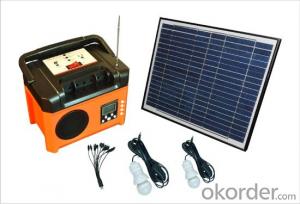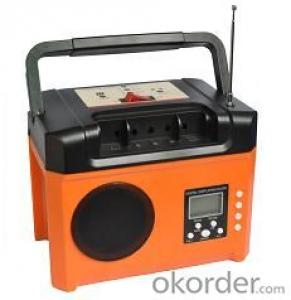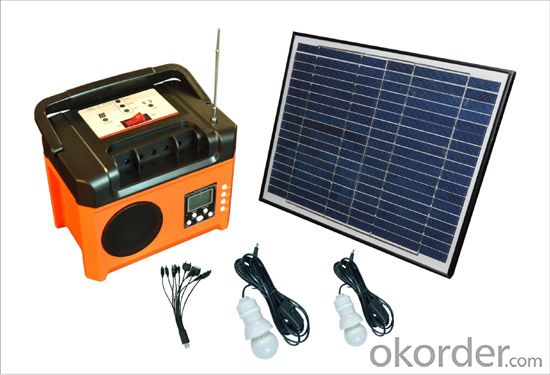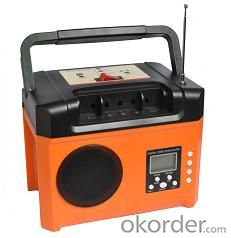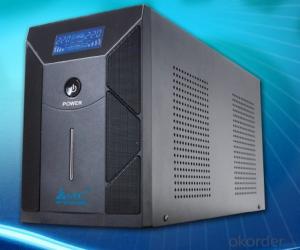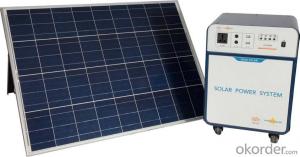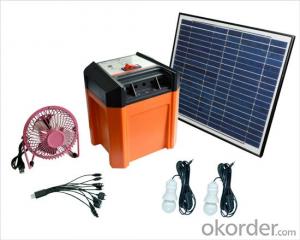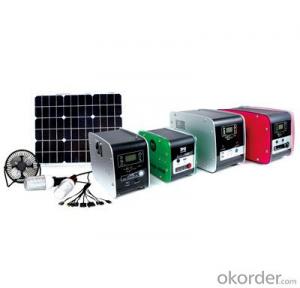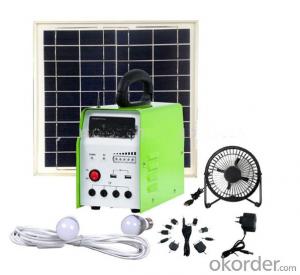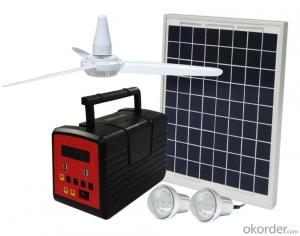Solaron Solar Energy Systems - Solar Power System with FM Radio, Built-in Battery, and USB
- Loading Port:
- Shekou
- Payment Terms:
- TT OR LC
- Min Order Qty:
- 50 unit
- Supply Capability:
- 5000 unit/month
OKorder Service Pledge
OKorder Financial Service
You Might Also Like
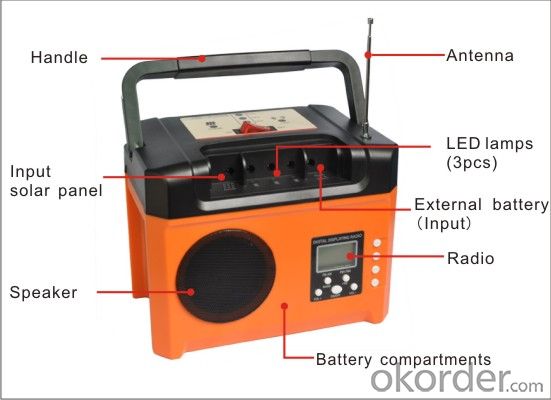
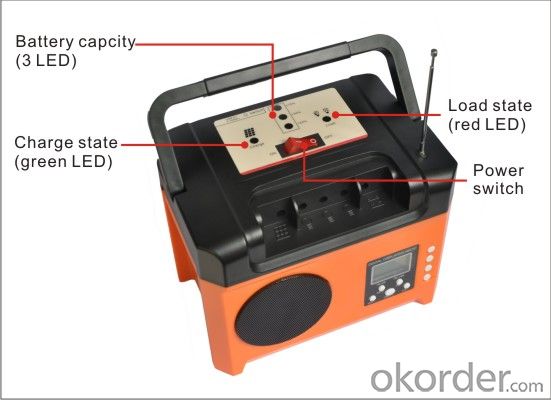
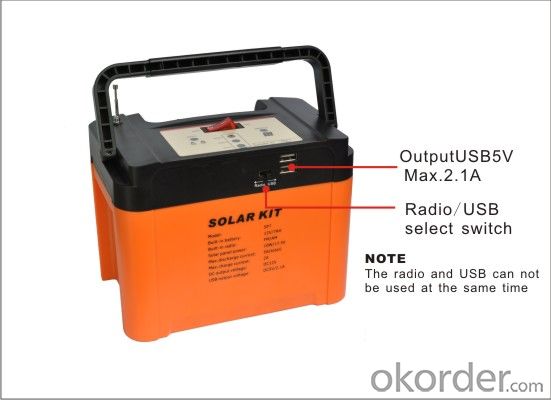
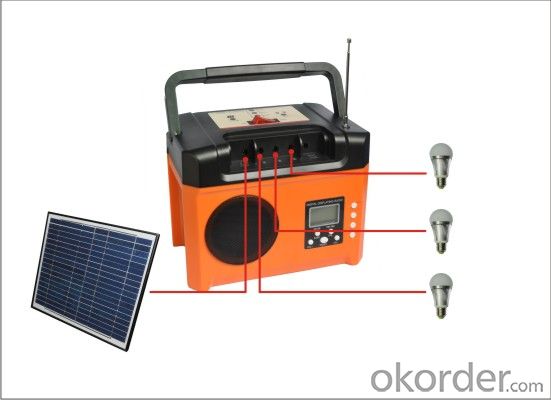
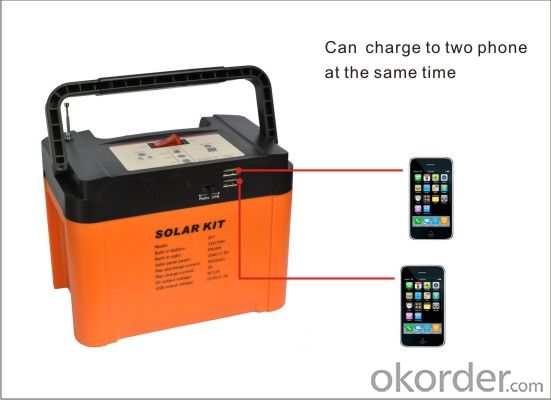
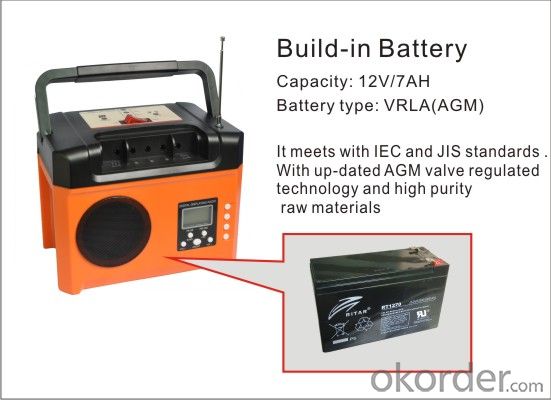
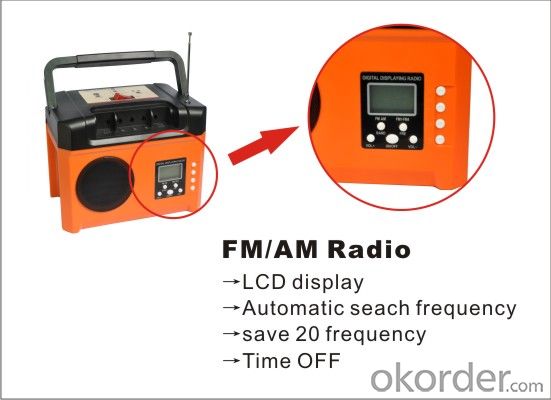
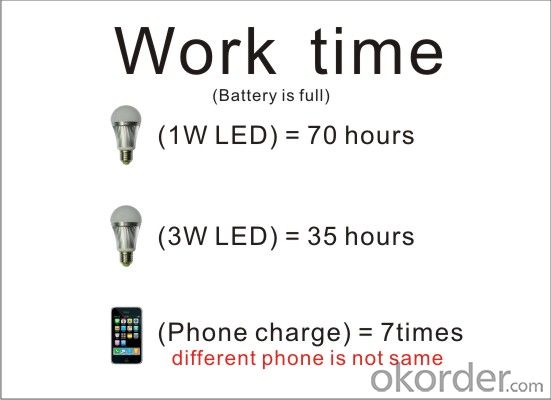
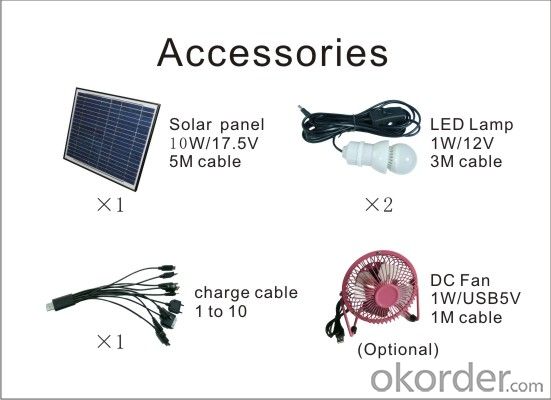
This system designed to provide DC power supply for power lighting,mobile phone charging,run the DC Fan and Radio,etc
Built-in maintenance-free Lead-acid battery
Build-in FM/AM Radio
Adopt the latest PWM Control modulation,real time display of battery capacity and load status.
With several output socket,can output voltage DC 12V and DC 5V at the same time.
It can charged by solar panel
Voice warning and together LED indicator shows the battery get low.
Bulit-in battery capacity:12V/7AH
Solar panel power:10W/17.5V
Max.discharge current(total):5A
Max.charge current:2A
DC Output voltage:DC12V
Weight:2.5KG
Work temperature:-20-40
USB output voltage:DC5V/2.1A
DC socket:DC2.5mm
- Q: What is a solar inverter and why is it necessary?
- A solar inverter is an electronic device that converts the direct current (DC) electricity generated by solar panels into alternating current (AC) electricity, which is used to power our homes and businesses. It is necessary because most of our electrical appliances and grid systems operate on AC power, while solar panels produce DC power. The solar inverter bridges this gap by ensuring the compatibility and usability of the solar energy, enabling us to utilize the power generated by solar panels efficiently and effectively.
- Q: Can solar energy systems be used for commercial purposes?
- Yes, solar energy systems can definitely be used for commercial purposes. In fact, many businesses across various industries are increasingly adopting solar power systems to reduce their reliance on traditional energy sources and lower their carbon footprint. Solar energy can be harnessed through photovoltaic (PV) panels or solar thermal systems, providing a clean and renewable source of electricity or heat for commercial buildings, manufacturing facilities, retail stores, and other commercial spaces. Moreover, installing solar energy systems can also lead to long-term cost savings and contribute to building a sustainable and environmentally friendly brand image.
- Q: Can solar energy systems be used in areas with limited access to solar energy insurance coverage?
- Yes, solar energy systems can still be used in areas with limited access to solar energy insurance coverage. While insurance coverage may provide financial protection in case of damage or malfunction, it is not a requirement for the installation and operation of solar energy systems. However, it is advisable to thoroughly assess potential risks and consider alternative risk management strategies in the absence of proper insurance coverage.
- Q: Can solar energy systems be used for powering off-grid humanitarian missions?
- Yes, solar energy systems can be used for powering off-grid humanitarian missions. Solar panels can convert sunlight into electricity, which can be stored in batteries for later use. This self-sustaining and renewable energy source can provide reliable power in remote locations where traditional electricity grids are unavailable or unreliable. Solar energy systems are environmentally friendly, cost-effective, and can power various necessities such as lighting, communication devices, medical equipment, and water purification systems, making them ideal for humanitarian missions in off-grid areas.
- Q: Can a solar energy system be installed on a commercial building?
- Yes, a solar energy system can be installed on a commercial building.
- Q: Can solar energy systems be used for powering satellites?
- Yes, solar energy systems can be used for powering satellites. Solar panels on satellites capture sunlight and convert it into electricity, which is stored in batteries for use during periods of darkness or when sunlight is obstructed. This sustainable energy source is reliable and widely used in the space industry to power satellites and other space missions.
- Q: Can solar energy systems be used in countries with low sunlight availability?
- Yes, solar energy systems can still be used in countries with low sunlight availability. While the efficiency of solar panels may be slightly reduced in areas with less sunlight, solar energy can still be harnessed and utilized. Additionally, advancements in solar technology, such as the use of concentrated solar power and hybrid systems, have made it possible to generate electricity even in regions with limited sunlight.
- Q: How do solar energy systems impact the electricity pricing structure?
- Solar energy systems can have a significant impact on the electricity pricing structure by reducing the overall demand for electricity from the grid. As more households and businesses adopt solar panels, they generate their own electricity, leading to a decrease in the need to rely on traditional power sources. This decrease in demand can result in lower overall electricity prices, benefiting both solar energy users and non-users alike. Additionally, solar energy systems can also help stabilize electricity prices by providing a more predictable and stable source of energy, as they are not subject to fluctuations in fuel costs like traditional power plants.
- Q: How do solar energy systems affect water conservation?
- Solar energy systems can have a positive impact on water conservation by reducing the need for water-intensive conventional power generation methods. Unlike fossil fuel power plants that rely on large amounts of water for cooling, solar energy systems do not require water for operation. This helps to preserve and conserve water resources, especially in areas facing water scarcity or drought conditions. Additionally, solar energy systems can be used to power water pumps and purification systems, further promoting sustainable water management practices.
- Q: What is the lifespan of solar batteries?
- Solar batteries can have varying lifespans depending on multiple factors. Typically, high-quality batteries can last anywhere from 5 to 15 years. However, some batteries have been known to last over 20 years with proper care and maintenance. Several factors influence the lifespan of solar batteries. These include the type and quality of the battery, how much energy is used before recharging (depth of discharge), the frequency of charging and discharging cycles, and overall battery system maintenance. It's important to be aware that solar batteries can experience a decrease in capacity over time, resulting in reduced energy storage capabilities. This gradual decline is referred to as battery degradation. While this is an inevitable process, proper maintenance and care can help slow down the rate of degradation. To prolong the lifespan of solar batteries, it is recommended to regularly monitor the battery's state of charge, avoid deep discharges, and ensure proper ventilation and temperature control. Following the manufacturer's guidelines for maintenance and replacement can also help maximize longevity. In conclusion, investing in high-quality solar batteries and proactively maintaining them can significantly extend their lifespan, ensuring reliable and sustainable energy storage for your solar power system.
Send your message to us
Solaron Solar Energy Systems - Solar Power System with FM Radio, Built-in Battery, and USB
- Loading Port:
- Shekou
- Payment Terms:
- TT OR LC
- Min Order Qty:
- 50 unit
- Supply Capability:
- 5000 unit/month
OKorder Service Pledge
OKorder Financial Service
Similar products
Hot products
Hot Searches
Related keywords
